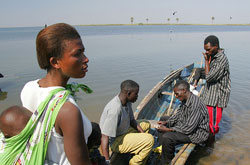
Photo: Future Agricultures
Christine Okali’s latest blog challenges policy makers to scrap the handy (and often unsupported) narratives on women/gender and climate change.
Here is some of what she said – but do read the whole blog!
“It is time to re-socialise gender policies. For real progress to be made towards gender equity and transforming gender relations across a range of institutions, policies must build on a more realistic understanding of the lives of women and men and their complex and changing relationships.
“In small-scale fisheries, for example, this means acknowledging gender relations between “boat owners, fish processors and sellers who are also wives, husbands, community members, and co-workers”, as one FAO report puts it; and looking at the role of social norms and values in constraining (or, in some cases, supporting) behavioural change and limiting the resilience of many women, but also of many men.
“Narrowly framed strategies are not ideal starting points for adapting to change. Projects with such strategies are unlikely to enhance the capacity of, for instance, small-scale fishing communities to adapt to climate change. A strategy which promotes gender-aware solutions that are fish-specific, focused especially on women characterised as vulnerable – and which ignores the existing evidence of the capacity of individuals and communities involved in fisheries to deal with livelihood threats – is unlikely to succeed.”
Note: The FAO report referred to can be downloaded here: https://www.fao.org/3/a0990e/a0990e.pdf
This entry was posted in: Freshwater Fisheries, Gender, Marine Fisheries, Men, Women
